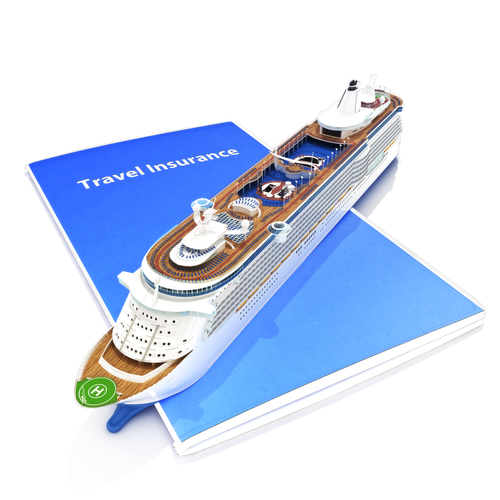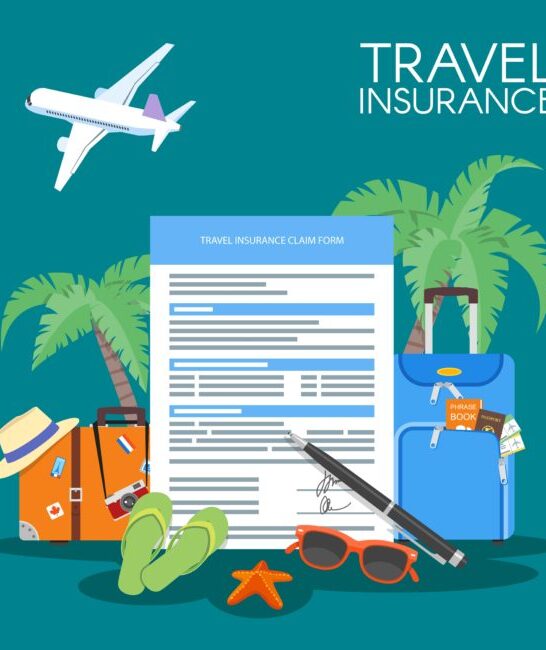
Planning your cruise is an exciting time. You’re picking out destinations and imagining the fun ahead. But somewhere in the middle of all this excitement, the topic of cruise insurance will likely pop up. It might feel like just one more thing to pay for, but it’s worth considering for peace of mind. And it may also save you considerably more money in the future should calamity strike.
Getting cruise insurance isn’t just ticking a box. It’s a smart move to protect yourself from unexpected problems.
No matter how you book your cruise – through an agent, online, or directly with the cruise line – thinking about insurance is a good idea. It’s important to know what it covers and when to get it, so you can enjoy your cruise without worrying.
You may be tempted to save a few dollars by skipping the optional cruise insurance. These are the essential facts you should know when making that decision.
Cruise Insurance Is Always Worth It
As a general rule, it is always worth it to buy some type of cruise insurance. The expense that you would likely incur if you had to cancel or interrupt your trip would far exceed the premium amount for a reasonable cruise insurance policy.
Once you have made cruise reservations for your entire family, you will likely have run up a meaningful bill– likely thousands of dollars.
Most cruises refundable to some extent until the final payment date. That date, however, typically falls 90 days in advance of the cruise. If you cancel after the final payment date, you will incur a monetary penalty. The penalty increases the closer you get to the embarkation date – anywhere from 25% to 100 percent.
Protecting the money you have already paid
A wide range of life events can pop up for you or a member of your travel party in the three months before a cruise that could require canceling. It doesn’t necessarily mean that something bad or catastrophic has to happen.
For instance, I had a friend who discovered that she was pregnant shortly after the final payment date. By the time her cruise was set to depart, she would have been too far along in her pregnancy to board the ship, under the applicable rules of the cruise line.
Fortunately, pregnancy was a covered event under her cruise insurance policy, so she was relieved to learn that she wasn’t going to forfeit any of the money that she had already paid the cruise line.
While serious illness or death would obviously be covered, many other circumstances outside of your control could force you to cancel your paid trip.
In addition to the pregnancy example, many cruise insurance policies also would cover cancellations due to: extension of the school year (e.g., excess snow days!), jury duty, court subpoena, involuntary job loss, robbery of your home or business, victims of certain crimes, and various negative events at your destination.
Also, many less dramatic events could delay or prevent you from boarding the ship. For example, simple flight delays and/or missed connections can keep you from making it to the port on time.
Protection against additional burdensome expenses
The risk of forfeiting the entire value you paid for your family’s cruise should itself warrant insurance. But, your potential losses are not capped by the value of the cruise. There are many potential mishaps that you may encounter while on your vacation that could easily add thousands of dollars in unexpected expenses.
For instance, the cost of a medical airlift or evacuation should you or a family member fall ill while in the middle of the ocean or in a foreign country with sketchy medical service. A true medical evacuation and transport could easily exceed $25,000. (See, e.g., USA Today, Five Myths About Medical Evacuations and Medical Evacuation Insurance).
You may wonder whether your regular medical insurance or homeowner’s insurance and the like may cover some of these risks. That is highly unlikely. If you are considering that as a fallback, you should confirm with your insurance company before departing.
Overview of Common Cruise Coverage Options
In short, travel insurance helps protect you and your family if things go wrong before or during your trip. So what should you a good travel insurance policy to cover?
| Coverage Type | Benefit |
| Trip Cancellation | Reimburses non-refundable trip costs |
| Trip Interruption | Covers if you must end your cruise early |
| Medical | Pays for emergency medical expenses (on ship or on excursions) |
| Evacuation | Medical evacuation coverage included (removal and transport) |
| Baggage | Baggage coverage for loss or theft |
| Accidental Death | Provides funds in the worst-case scenario |
| Pre-existing Conditions Waiver | Clear coverage for existing conditions |
| Emergency Assistance Services | Designated agents can help organize your care and evacuation |
If you don’t purchase travel insurance and something goes wrong, you will be on the hook financially for solving the problem, and it will likely be up to you to work out any necessary arrangements (as opposed to having someone else facilitate).
Timing For Buying Cruise Insurance
You will be offered travel insurance at the time you make reservations. But, you are not required to purchase it right away. You can wait until closer to that final deadline.
Why might you want to wait? Typically, travel insurance policies have their own cancellation windows. You will have some period of time to review the policy closely and change your mind for a full refund of the policy premium – usually about 10 days. Thereafter, the premium is non-refundable.
If you purchase the policy too early, you could easily face the situation where you cancel or change your cruise prior to the final payment deadline, but cannot get a refund on the insurance – a policy that is no longer of any use to you.
There are concerns, however, about waiting too long to try to purchase insurance for your cruise. Dragging your feet could mean you miss out on some key perks.
Things like coverage for any pre-existing conditions or the freedom to cancel for whatever reason you want often have a limited purchase window. Such coverage usually must be purchased within 14-21 days after you’ve put down your trip deposit.
Leaving it late could mean steeper premiums and maybe not getting the cover you hoped for. So, while you don’t have to purchase insurance at the same time you book your cruise, you should start looking into the available options shortly thereafter, so you don’t wait until it’s too late.
Knowing you’ve got time on your side means you can shop around to find the best insurance fit for your family’s cruise adventure. But, you want to avoid missing out on essential coverage and ensure you’re protected against any surprises that could pop up before you set sail.

You Have Many Options Besides The Cruise Line
While most cruise lines offer some form of travel insurance, the cruise line offering is often not your best option. Most travelers are better off buying cruise insurance somewhere else where they will likely get better coverage at a cheaper price.
The policies that cruise lines offer often have less attractive features than other policies. For example, many cruise lines offer to let you book another trip if you have to cancel your cruise. But, limit you to rebooking within 12 or 24 months.
In contrast, third-party insurance companies will just send you a check to cover your costs and let you decide how and when to use the money.
Another potential unattractive feature found in some policies is that they provide only “secondary coverage,” rather than primary coverage.
In other words, the secondary policy will only apply once you have attempted to obtain payment from your other insurance sources, such as homeowners, private medical, credit cards, etc. Secondary coverage delays your ability to get reimbursed.
Once you look beyond the cruise line’s offerings, you have many options open to you. If you book through a travel agent, the agent will have policies to sell and/or recommend. Also, many of the major insurance companies that offer home and auto insurance also offer travel or cruise insurance. So, when looking for cruise insurance you could start by asking your insurance agent what they can offer you. You should also ask friends and family that have bought travel insurance in the past.
Ultimately, you will need to examine the different options side by side. Compare what different travel insurance companies cover, what they charge, and how much they cover. Some companies may only cover 50% of your travel expenses for last-minute cancellations. Some will cover more and some may even cover less.
Several websites offer tools comparing travel insurance: www.insuremytrip.com; www.squaremouth.com; www.tripinsurancestore.com.
Common features of a comprehensive policy include coverage for trip interruption, trip cancellation, trip delay or missed connections, baggage loss or delay, medical expenses, medical evacuation, repatriation, involuntary job loss, or pregnancy. A good policy will extend coverage when these events happen to you, or you have to cancel because the event happens to a travel companion. You will also want a policy that provides full reimbursement regardless of when a cancellation occurs.
Shopping for travel insurance may not be as fun as perusing shore excursion options, but it should provide you and your family peace of mind, even if you never have to use it.
Frequently Asked Questions
What does cruise insurance typically cover?
Cruise insurance generally includes protection for a range of potential issues. Here are some common coverages:
Trip Cancellation: Reimbursement for prepaid, non-refundable expenses if you have to cancel your trip for a covered reason.
Trip Interruption: Coverage if your trip is interrupted due to an emergency or unexpected event.
Medical Expenses: Coverage for medical costs if you get sick or injured on your trip.
Emergency Medical Evacuation: Arrangements for medical evacuation to the nearest suitable medical facility if needed.
Baggage Loss or Delay: Reimbursement if your luggage is lost, stolen, or delayed.
How can I find the most affordable yet reliable cruise insurance?
To find a balance between affordability and reliability:
Compare Plans: Look at various policies from different providers to compare coverage and prices.
Check Reviews: Read customer reviews and ratings to gauge the reliability of the insurer.
Understand Coverage: Ensure the plan covers essentials like medical expenses and trip cancellation.
Consult Agents: Speak to insurance agents who can help tailor a plan to your needs.
Are there specific cruise insurance plans recommended for senior travelers?
Comprehensive Coverage: Higher medical coverage limits, which may be beneficial due to the increased health risks associated with aging.
Pre-Existing Condition Waivers: These plans may include waivers if purchased within a certain timeframe after booking your trip.
Is it possible to purchase cruise insurance post booking?
You can purchase cruise insurance after booking your cruise, but:
Time-Sensitive Benefits: Certain benefits like pre-existing condition waivers may only be available if the policy is purchased soon after making the initial trip deposit.
Earlier Is Better: Generally, it’s advisable to get insurance soon after booking to ensure you’re covered for any unforeseen events leading up to your trip.
How do the coverage options differ between major cruise insurance providers?
Coverage options vary by provider, but here are some differentiators:
Coverage Limits: Some providers offer higher coverage limits for medical expenses or evacuation.
Specific Benefits: Providers may offer unique benefits, such as “Cancel For Any Reason” coverage or coverage for adventure activities.
Exclusions: Each policy has its own set of exclusions, so carefully review what is not covered.
Closing Thoughts
Buying cruise insurance might seem like an annoying added expense, but it’s worth it. Think of cruise insurance as your pocket life preserver, something to hang onto when things go sideways. Whether it’s a last-minute cancellation, a medical emergency, or misplaced luggage, having insurance means you’re covered, so that your cruise vacation remains as enjoyable as you imagined.

Elaine Warren
Founder & Crew Chief
Elaine founded this website after publishing the book The Family Cruise Companion’s Guide to Cruising With Kids. (Second edition recently released!) She has sailed on 50 cruises (and counting). She loves helping families navigate their way to an adventure-filled, fun, and memorable vacation.
